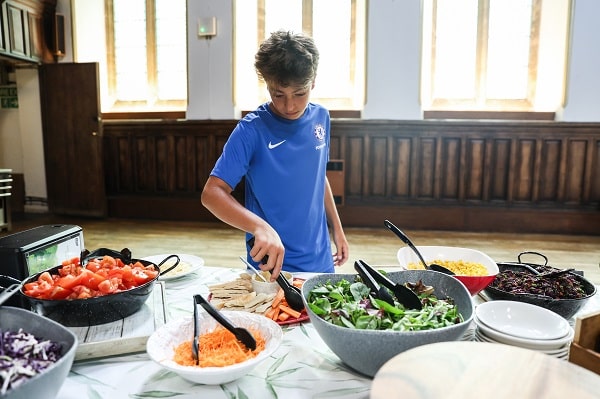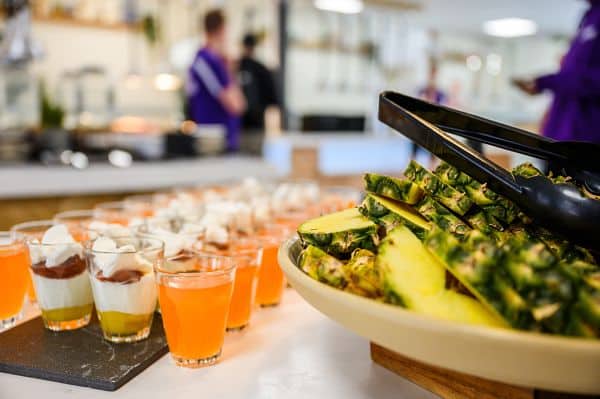What’s the Ideal Diet to Boost Your Sports Performance?
Do you want to run faster, last longer during training, be more explosive, or recover more quickly after a workout?
If you play sports regularly, you need to know that training alone isn’t enough — your daily diet plays a vital role in your performance.
Whether you practise athletics, dance, basketball, swimming, or any other sport, eating well will help you improve faster, prevent injuries, and stay in top condition.
You don’t have to be a nutrition expert — just a few good habits can make a big difference.

Why Is Nutrition So Important for Young Athletes?
Think of your body as a machine: to perform at its best, it needs the right fuel. Eating the right foods helps you to:
- Have more energy during training and matches.
- Recover faster after exercise.
- Build stronger muscles and strengthen your immune system.
- Stay focused and mentally sharp.
- Reduce the risk of injuries.
In short, nutrition is just as important as training for young athletes.
The good news? Eating well doesn’t have to be complicated!
Eating Well Doesn’t Mean Giving Up Your Favourite Foods
Many people think eating healthily means giving up all the tasty things they enjoy. Not true!
You can still eat what you love — as long as it’s balanced and you choose the right foods at the right times.
The key is to eat a variety of natural, high-quality foods, and to learn how to make smart choices before, during, and after your workouts.
The 3 Pillars of Nutrition for Young Athletes
1. Carbohydrates – Your Energy Source
Carbohydrates (or complex sugars) are your fuel to move. They’re what keep you running, jumping, defending, or attacking without crashing after ten minutes.
Where to find them:
- Rice, pasta, wholegrain bread, couscous.
- Potatoes, sweet potatoes.
- Oats.
- Fruits like bananas, dates, or apples.
Tip: Eat carbohydrates around 2 hours before training or a match to fuel up without feeling heavy.
2. Protein – For Stronger Muscles
Protein helps build, repair, and strengthen muscles.
If you want to get stronger, recover faster, and avoid injuries, you need to consume protein after each session.
Where to find it:
- Lean meats (chicken, turkey), eggs, fish.
- Dairy products (plain yoghurt, cottage cheese).
- Legumes (lentils, chickpeas, kidney beans).
- Tofu or tempeh for vegetarians.
Tip: Eat a source of protein right after your workout to support recovery.
3. Healthy Fats – For Endurance
Not all fats are bad. Healthy fats are crucial for your heart, brain, and long-lasting energy.
Where to find them:
- Avocados, nuts, almonds, seeds.
- Plant-based oils (olive, rapeseed, flaxseed).
- Oily fish (salmon, sardines, mackerel).
Tip: A handful of almonds or walnuts makes the perfect pre- or post-training snack.
Hydration: A Key Factor
Even slight dehydration can reduce your performance. You may lose focus, speed, and energy.
Golden rules:
- Drink water regularly throughout the day, not just during training.
- Aim for 1.5–2 litres per day, or more if it’s hot or you sweat a lot.
- Avoid fizzy drinks or sugary energy drinks.
What to Eat Before and After Training
Before exercise:
Have a proper meal about 2–3 hours before you start. It should include carbohydrates, some protein, and little fat.
Example:
- Wholegrain pasta + chicken + cooked vegetables.
- A piece of fruit (banana or apple).
After exercise:
Your body needs to refuel and repair muscles. Eat something within an hour of training.
Example:
- Rice + eggs + vegetables.
- Cottage cheese + apple purée.
3 Quick and Healthy Snack Ideas
- Wholegrain bread + peanut butter + banana.
- Plain yoghurt + berries + honey.
- Homemade smoothie with plant-based milk + banana + oats.

What About Young Footballers?
Football is a very demanding sport requiring endurance, speed, power, and focus.
To perform for 90 minutes at full intensity, your nutrition must match your effort.
Before a match:
Eat a complete meal at least 2 hours before kick-off, including complex carbs (rice or wholegrain pasta), lean protein, and vegetables.
30–60 minutes before the game:
Have a banana or a homemade energy bar for a final energy boost.
After the match:
Refuel with a solid meal rich in carbs and protein to help your muscles recover.
Looking For Soccer Camps and Sports Nutrition
At Looking For Soccer camps, everything is designed for the complete development of young footballers — and that includes sports nutrition.
During these camps, you’ll get practical tips on building healthy eating habits to perform at your best while taking care of your body.
